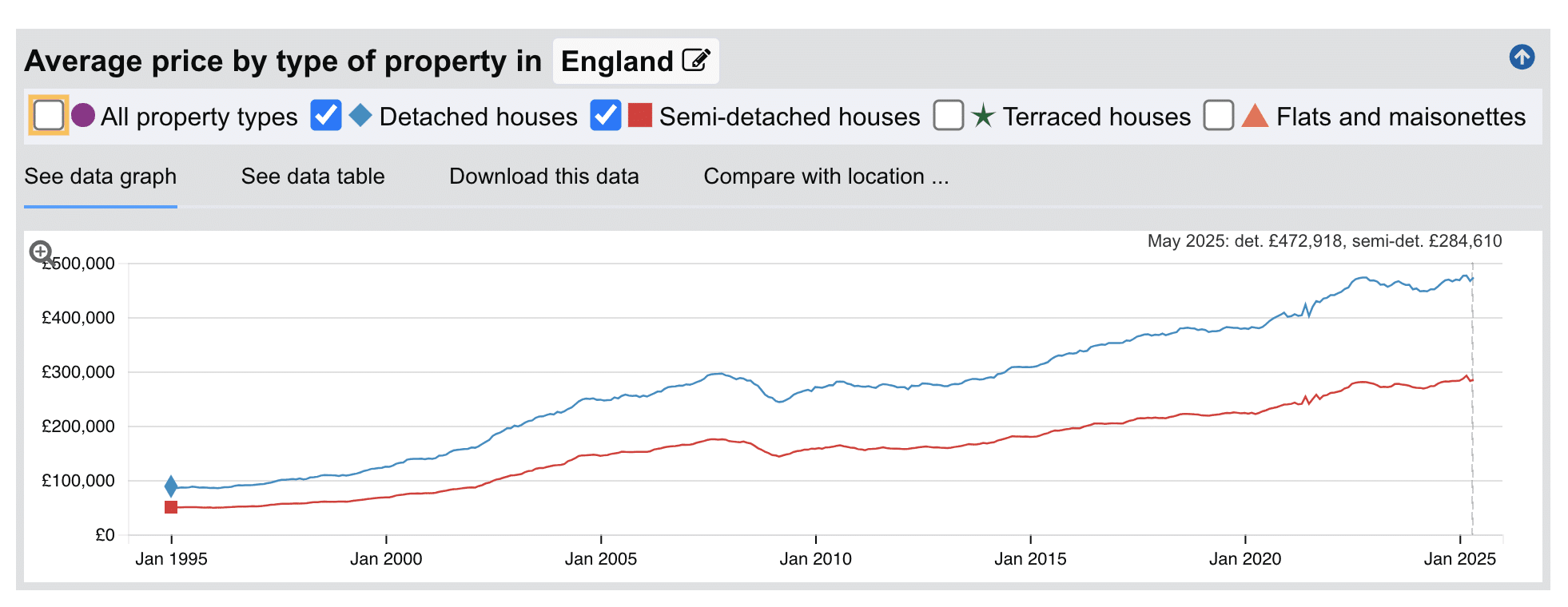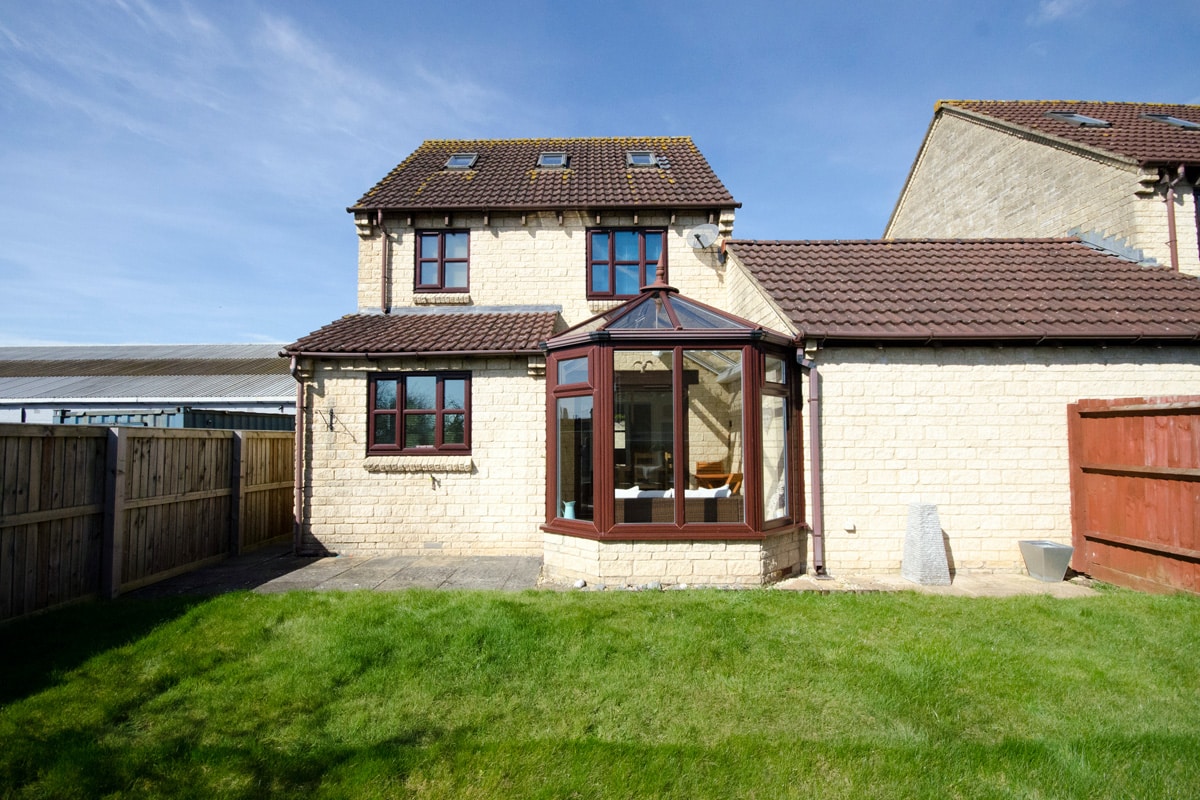What is a Link-Detached House?
A link-detached house is a property that shares no common living walls with neighbouring homes but is connected through a garage or outbuilding. Unlike semi-detached houses, where living spaces adjoin, like a living room or kitchen that shares a common wall, link-detached properties maintain the privacy of detached homes while sharing only non-habitable structures with neighbours.
Article Updated: August 2025

-
by Robert Jones, Founder of Property Investments UK
With two decades in UK property, Rob has been investing in buy-to-let since 2005, and uses property data to develop tools for property market analysis.
Link-Detached House Definition?
For a formal definition, according to RICS surveyors,
A link-detached property or house is a term given to residential units that share no common walls with another house or dwelling. They are, however, typically linked together by a garage.
A link-detached house can also be a house that is linked by a garage plus a first-floor room above. These are less common and much more like semi-detached houses than detached houses.
Bungalows can also be link-detached. A link-detached bungalow is a bungalow linked to another by a garage.
Link-detached houses were most popular between the 1960s and 1990s. Builders built linked detached houses to save on land and fit more onto a site, reduce building costs and make prices more affordable.
Access our selection of exclusive, high-yielding, residential investment property deals and a personal consultant to guide you through your options.
Is a Link-Detached House Worth As Much as a Detached House?
Typically yes, however there’s no easy answer, as often these houses are built in rows in a street, with all properties sharing the same design, so often the properties have a similar market value, although the nearest true detached houses may not be in close proximity and may even be in a different postcode sector, so comparing prices needs to consider not just the property style but also the location.
When compared to semi-detached houses, detached houses are often much more.
The sold house price data from HM Land Registry, shows a significant difference with Detached house prices in England averaging £472,918 and Semi-detached houses showing £284,610. A difference of 66.2%. So, if you are looking at the best place to invest £100k in UK property, a detached house is out of budget.

UK House Styles
UK house styles include
- Detached
- Link-detached
- Semi-detached
- Terraced
- Maisonettes
- Apartments/Flats
When it comes to housing structures, there are two main categories: attached and detached homes.
A detached home is a stand-alone structure that sits on its own plot of land. It's the responsibility of the homeowner to maintain the entire property, and there are no shared walls with neighbouring properties.
An attached home shares one or more walls with neighbouring units. Shared walls mean that noise from neighbours can be an issue, and residents need to be considerate of their neighbours.
A semi-detached or end-of-terrace house is a type of attached home that shares one wall with a neighbouring property, while a terraced house shares walls with both neighbouring properties.
In contrast, a link-detached house falls somewhere between detached and attached homes. This type of property shares a wall with another property, but also has an unattached side. This is different to a glass link house (resource: what is a glass link property?).
Generally speaking, detached homes provide more privacy and floor space compared to attached homes.
However, attached homes are much more common and is how most people live in the UK as they are much more affordable.

Are They 'As Good' as a Detached Houses?
As the old saying goes, beauty is in the eye of the beholder. In much the same way, whether a link-detached house is as good as a detached one is subjective.
They provide the same benefits of privacy, noise reduction and space.
However some buyers are put off if they are looking for true detached homes with no connection with neighbours. In reality though, all property, all land shares borders with other owners, in the case of a link detached house, it may share fences in the garden aswell as a common wall for a section of the building like a garage.
Possible Problems
Here are some of the possible downsides of buying and living in a link-detached house:
- They may be on a smaller plot and have less space surrounding them than detached houses.
- Unlike a detached house, link-detached houses only have a garden on three sides at most.
- They may have more issues with noise from the neighbours or a lack of privacy.
- Sometimes, they have shared access, such as a shared driveway.
- There may be shared maintenance issues with a link-detached property: when the shared garage wall or roof needs maintenance work, is where cooperation becomes vital. After all, you and your neighbour will share the costs. Right?
- There may be increased costs with insurance if they believe the link aspects of the building increase risk for fire damage, flood damage or roof damage.
- It is more difficult to extend a link-detached house than a detached house. With link-detached properties, there is often less space to build into.
- Problems with link-detached houses can arise if you, or your neighbour, wants to convert the garage, build over it or add an extension. Problems can arise regarding who owns what and who is entitled to do what with the shared boundary.
- The party wall of link-detached houses may come under the Party Wall Act 1996 with any work involving a party wall agreement.
- It could restrict to what extent you can extend a link detached house without applying for planning permission.
- If the owners of link-detached houses decide to extend (or even convert their garage), it could mean that the two dwellings are no longer link-detached but have become semi-detached. This could affect the value and saleability of the houses.
- Link-detached houses offer scope for more problems and disputes with neighbours than detached houses. Think of a shared garage roof, gutters or drains running underneath the buildings that are connected.
Do Link Detached Houses Have Problems With Noise?
One of the common complaints with link-detached houses is that noise can easily travel from one structure to another.
This is true of course with any structure.
But it needs to be looked at with perspective.
What is the connected structure? If a garage for example, is it insulated? Does it need to be a completely quiet space, or is some noise ok?
Are They More Difficult to Sell?
Some believe it is harder to sell a link-detached house than a detached house.
This is because link-detached often cost more than semi-detached houses or terraces yet can involve some of the same ownership issues.
However, there is no hard evidence that link-detached houses are harder to sell, and if the property is in a good location, is priced correctly and is in the right condition to attract local buyers, then finding a buyer for your property should be no problem.
